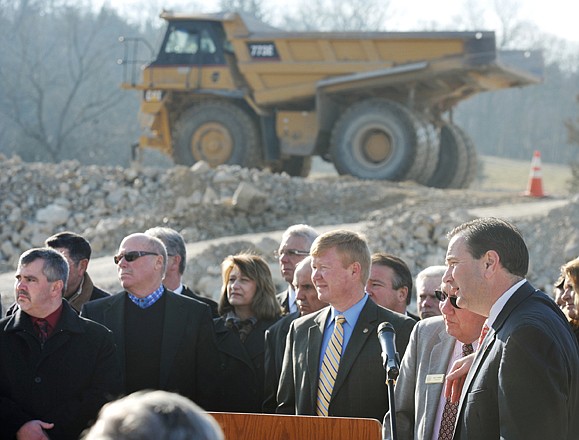Supporters say Missouri's transportation system needs more money to make needed improvements.
And state Sens. Mike Kehoe and Ryan McKenna want the state's voters to decide if they want to pay an extra penny in sales taxes to make those improvements happen.
"This is a huge opportunity for us, and for all Missourians right now," Kehoe, R-Jefferson City, said Tuesday morning.
"Our proposal, over the next 10 years, would put 270,000 jobs and just under $8 billion into Missouri's economy."
They touted the sales tax proposal at a news conference near an ongoing road-widening project on U.S. 50 in Osage County.
Later, Kehoe and McKenna filed a proposed constitutional amendment - which voters statewide would have to pass, by a simple majority vote - to raise the state's sales tax.
Kehoe noted the amendment also promises voters that money raised by the tax couldn't be diverted to other projects, that lawmakers can't raise the current tax on motor fuels and diesel during the decade the tax would be charged, and tolls would not be charged on existing roads.
"There's nothing tricky, or that we're trying to hide, in here," Kehoe said.
Both the Senate and House would have to approve the plan before it could go to a statewide ballot.
As a proposed amendment, Gov. Jay Nixon has no role to play, other than setting an election date different than the Nov. 4, 2014, general election.
"As I've said in the past, continuing discussion about what the long-term transportation needs are in this state is important," Nixon told reporters at a Monday news conference.
"It's good that they're moving this, and we'll see what discussion is spurred."
McKenna told Tuesday's news conference that his family got involved in local and state highway issues as "an emphasis on safety," and he remembered a friend killed in a Jefferson County accident.
But, he noted, in recent years MoDOT has made many safety improvements, including rumble stripes along highway edges and barrier cables in medians.
Five years ago, (1,200) people were killed on Missouri's roads," he said. "Last year, it was less than 800."
Kehoe said if the Legislature approves sending the issue to a statewide vote, lawmakers will ask the six-member Highways and Transportation Commission to come up with a list of projects for the money they would receive from the 1-cent sales tax - an average $790 million for each of the 10 years - if voters approved it.
Ten percent of each year's receipts - an average $79 million each year - would be distributed to the cities and counties, leaving an average of $711 million for the state Transportation Department to spend on roads, bridges, airports, ports, railroads, light rail, buses, bike paths and other transportation modes.
"Should the tax pass," Kehoe said, "the Highway Commission and highway department would be held accountable to the voters and to the Legislature, and (be required to) update us annually on that list."
Neosho banker Rudy Farber, the commission's current chairman, said: "We need to make sure that we do as well for the generation that follows us as the generation that preceded us."
Both senators said approving the sales tax increase would just be a beginning - because a series of meetings around the state by two different groups, coupled with some opinion polls, show that Missouri residents and businesses identified $20 billion of improvements as needed across the state.
Kehoe said he thinks voters are ready to consider a tax increase proposal, "I think because they understand it's the right time ... for our economy, to continue the advancements MoDOT has made."
He also said voters will understand that they all benefit from transportation, even if they're not buying fuel for their own vehicles.
"If you go to a store and you get something off a shelf, that product got to that store somehow," Kehoe explained. "We all purchase goods at various retailers across the state."

